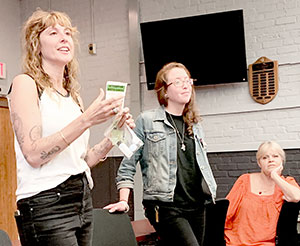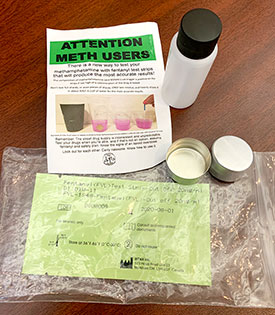
ACCESS Drug User Health Program, in conjunction with the cities of Somerville and Everett, held a discussion forum last week focusing reducing drug overdoses. ~Photos by Melissa Rosales
By Melissa Rosales
ACCESS Drug User Health Program partnered with the City of Somerville and Everett to discuss overdose aftercare services, harm reduction and the use of fentanyl strips last Wednesday, June 19 at the Public Safety Building, 220 Washington St. The ACCESS mobile health van was also present for tours to explain how they can assist in reducing overdoses.
ACCESS serves active users and their loved ones with programs and services like education, grief supports, Family Resource Detox Clinics, family safety planning, Narcan kits, Suboxone treatment, Hepatitis C and HIV testing.
“Our mission really is we’re reaching out for aftercare to you and your loved ones together to prevent overdoses and keep these people safe. You are the experts in your own lives. You and your loved ones deserve access to care, safety, education, and resources in your own community,” Outreach Manager of ACCESS Kristin Doneski said.
Doneski stressed that there is a misconception that drug users don’t care about their health. The community team provides access to Hepatitis C treatment, wound cleaning, and clean supplies like needle exchange. ACCESS also helps connect women to doctors who can prescribe them with Pre-exposure prophylaxis (or PrEP) to prevent HIV.
 “I just think it’s such an important thing right now to be able to give them a little bit of hope and give them information and say, ‘Hey, well, you know, when you’re ready, this is available. When you’re ready, did you know,’” said Jodi Horton, Overdose Aftercare Specialist and person in recovery.
“I just think it’s such an important thing right now to be able to give them a little bit of hope and give them information and say, ‘Hey, well, you know, when you’re ready, this is available. When you’re ready, did you know,’” said Jodi Horton, Overdose Aftercare Specialist and person in recovery.
Director of Community Outreach and Harm Reduction at the Somerville Police Department Patty Contente said the public safety sector records overdose calls. The partnership of the public safety and Overdose Aftercare Community Teams allows the teams to check back with the household and provide resources and information in a comfortable space.
“Change is hard. We can never force anybody. We strive to be independent. Valuing people’s decision making is what harm reduction is all about,” Contente said. “It’s not ‘treatment or nothing.’ We want to embrace everyone and offer different kinds of supports throughout the process.”
Fentanyl Test Strips were passed around and a brief demonstration was given after. The test strips are used to test for fentanyl in methamphetamine. Fentanyl is a cheap and potent synthetic opiate that is a depressant unlike meth that is a stimulant. Meth users need to test for laced fentanyl in their drugs to avoid accidental overdoses.
“I think any tools like this really help people stop, pause, and think about how they’re using their drugs, which we want everyone to do,” Doneski said. “I think it’s always important for people to know what’s out there as tools.”
After the demonstration, the ACCESS program gave a brief tour of their mobile health vans that they drive around to provide resources, support, and education to persons affected with drugs. Narcan kits, clean needles, condoms, abscess warmers, were labelled in blue drawers inside the van. Information on fentanyl and Hepatitis C were also taped to the van’s windows.
“We’ve lost so many people because people are afraid to talk about drugs,” Doneski said. “There needs to be an open discussion.”















Dear Melissa,
I read your article, “Overdose Aftercare Community Teams Discussion in Somerville.” I am interested in connecting with Kristin Donski of Access, but am having hard time finding her contact information. Would you mind connecting me with her. I work at Tufts and would like to ask her to speak to our students in Community Heath on this subject.
Yolanta Kovalko
Dept. Administrator,
Tufts University, Dept. of Community Health
yolanta.kovalko@tufts.edu